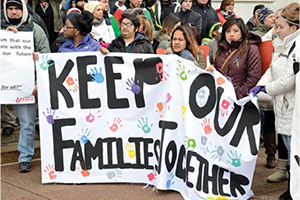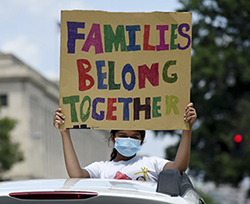Trauma-informed care and services for immigrant families: A three-part symposium

Understanding the importance of trauma-informed care and providing these services to underserved populations, specifically immigrant families, was the topic of a three-part virtual symposium held July through September 2020. Sponsored by the California Health Care Foundation, and the University of California, Davis (UC Davis) Center for Reducing Health Disparities, the symposium explored trauma-informed care and identified key recommendations and best practices for providing services to vulnerable populations in California.
Each event included a presentation as well as a moderated question and answer session that included questions submitted by audience members prior to and during the event.
The virtual symposium was organized as a three-part event, with each part focusing on a unique theme. The following issues were covered over the course of the symposium:
- Part 1: Reported on the experiences of immigrant families regarding the chilling effects and fears created by the “public charge” rule, the rescission of the Deferred Action for Childhood Arrivals (DACA) and Temporary Protected Status (TPS), increased deportations, and other anti-immigrant policies as trauma and adverse childhood experiences (ACEs).
- Part 2: Identified potential trauma-informed approaches by health care, mental health and social service providers caring for immigrant families.
- Part 3: Identified the financial impact of trauma on immigrant families, and potential policy and systems changes to support trauma-informed care and services for immigrant families.
Final Proceedings Report: Trauma-Informed Care and Services for Immigrant Families Proceedings Report (PDF)

July 28, 2020
The first symposium highlighted leaders’ perspectives on this topic, including a panel of experts who discussed the implications and influence of policy decisions.
Speakers
- Keynote: Demetrios G. Papademetriou, PhD Migration Policy Institute
- Panelists:
- Luis H. Zayas, PhD, University of Texas, Austin
- Mayra E. Alvarez, MHA, The Children’s Partnership in Los Angeles
- Samantha Artiga, MHSA, Kaiser Family Foundation
- Trauma in Immigrant Families – Public Charge, DACA and COVID-19 Part I Program (PDF)
- Trauma in Immigrant Families – Public Charge, DACA and COVID-19 Part I Slides (PDF)

August 25, 2020
The second symposium highlighted leaders’ perspectives on this topic, including a panel of experts who discussed the delivery of trauma-informed care, and the implications for practice and policy.
Speakers
- Fireside Chat: Nadine Burke Harris, MD, MPH, FAAP Office of California Surgeon General
- Panelists:
- Altaf Saadi, MD, MSc Massachusetts General Hospital Harvard Medical School
- Andrés Sciolla, MD, UC Davis Health
- Thu Quach, PhD, Asian Health Services
- How Health Systems and Providers Can Deliver Trauma-Informed Care To Immigrant Families Part II Program (PDF)
- How Health Systems and Providers Can Deliver Trauma-Informed Care To Immigrant Families Part II Slides (PDF)
September 22, 2020
The third and final symposium highlighted leaders’ perspectives on this topic, including a panel of experts who discussed the fiscal impact and policy solutions for providing trauma-informed care to immigrant families.
Speakers
- Panelists:
- Jeffrey Hoch, PhD, UC Davis
- Tanya Broder, JD, National Immigration Law Center
- Cynthia Buiza, MA, California Immigrant Policy Center
- Financial Impacts and Policy Solutions for Trauma in Immigrant Families Part III Program (PDF)
- Financial Impacts and Policy Solutions for Trauma in Immigrant Families Part III Slides (PDF)
